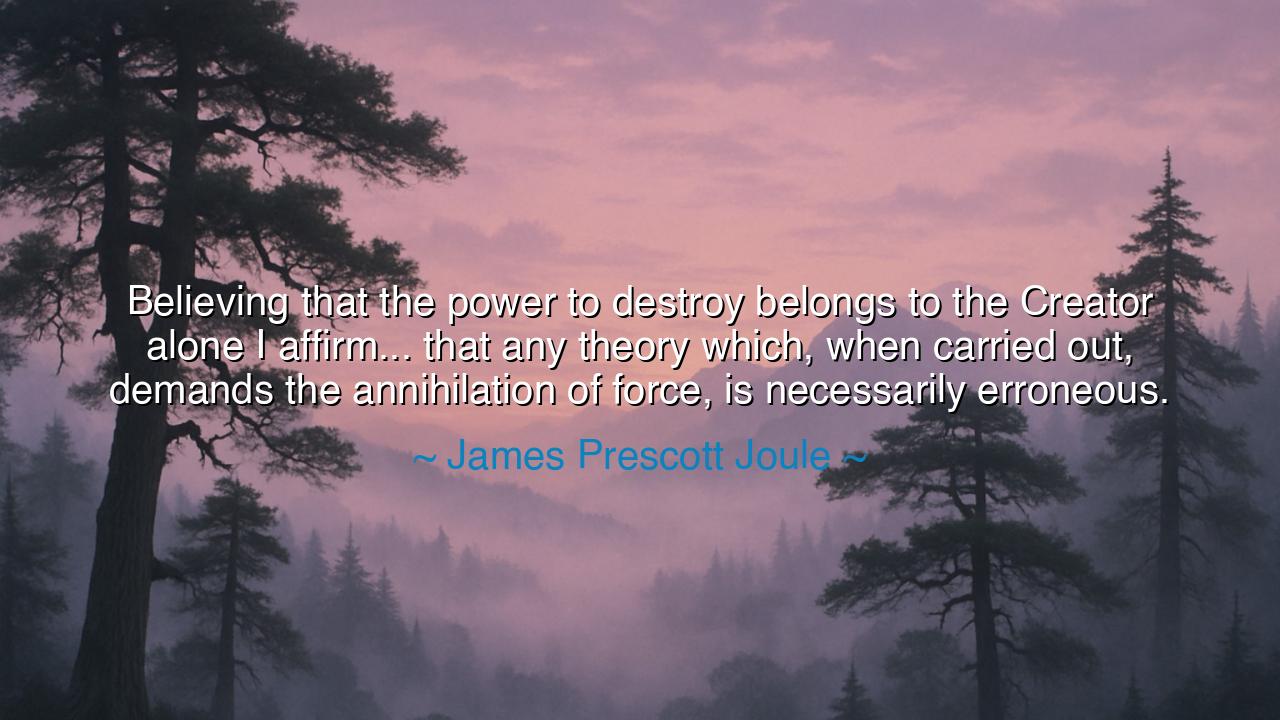
Believing that the power to destroy belongs to the Creator alone
Believing that the power to destroy belongs to the Creator alone I affirm... that any theory which, when carried out, demands the annihilation of force, is necessarily erroneous.






“Believing that the power to destroy belongs to the Creator alone, I affirm… that any theory which, when carried out, demands the annihilation of force, is necessarily erroneous.” — Thus spoke James Prescott Joule, the great English physicist whose discoveries forever altered our understanding of energy, matter, and the eternal balance of the universe. Though he lived in an age of machines and metals, his words rise beyond science into the realm of philosophy and faith. For Joule saw in the workings of nature not chaos, but harmony; not destruction, but transformation. He taught that the true order of existence reflects the eternal will of the Creator, where nothing is lost, but only changed — and in that divine continuity lies the proof of all truth.
The origin of this quote rests in Joule’s exploration of what we now call the law of conservation of energy — the principle that energy can neither be created nor destroyed, only converted from one form to another. In an age when science still wrestled with old beliefs, when some thought that heat or motion could vanish into nothingness, Joule’s experiments revealed a deeper unity. He measured the heat produced by motion, the work yielded by electricity, the transformation of one form of energy into another — and through his patience, he glimpsed a reflection of the divine order itself. The universe, he realized, does not destroy; it renews. Energy flows, evolves, and persists, much like the spirit of creation itself.
Yet Joule’s insight was not born from cold logic alone. He was a man of faith, one who believed that the natural laws of the universe were expressions of God’s perfection. When he declared that the power to destroy belongs to the Creator alone, he meant that man — and indeed, all creation — is bound by this sacred order. No mortal, no theory, no force in nature can truly annihilate what has been made by divine will. Matter may burn, decay, or dissolve, but its essence endures, reshaped by the eternal hand that governs all existence. In his vision, science was not the enemy of faith, but its instrument — a window through which the human mind could glimpse the infinite.
History bears witness to this harmony between faith and discovery. Consider Isaac Newton, who, centuries before Joule, gazed upon the heavens and discerned the laws of motion and gravity. Like Joule, he believed that the universe was not an accident, but a design, a testament to divine intelligence. Both men stood at the crossroads of science and spirit, daring to affirm that to understand the laws of nature is to revere the Creator more deeply. They showed that true wisdom is not found in denying mystery, but in recognizing its symmetry — that the physical and the spiritual are reflections of one eternal truth: nothing made by God is ever truly lost.
In Joule’s declaration that any theory demanding the “annihilation of force” is erroneous, there lies a moral lesson as well as a scientific one. For in life, as in physics, no act, no thought, no effort ever truly disappears. The energy of good deeds, of love, of creation, continues its motion through the web of existence, unseen yet eternal. Likewise, the energy of destruction — hatred, greed, or despair — transforms but does not vanish; it must be faced, redeemed, and redirected. Thus, the same truth that governs the stars also governs the soul: we are stewards of energy, not its owners. We cannot destroy, only transform — and in our transformations, we reveal who we are.
The ancients knew this truth by intuition. They spoke of cycles — of birth, death, and rebirth; of fire becoming ash, and ash nourishing new life. They saw that force and matter are threads woven through the fabric of eternity. Joule, in his modern wisdom, clothed this ancient truth in the garments of science, proving with numbers what poets and prophets had long known in spirit: that creation endures because it was designed to endure. To seek theories that deny this eternal balance is not only false in science, but blind in philosophy — for it denies the hand of the Creator that sustains all.
Therefore, let this be the lesson: do not seek to destroy what you cannot understand; seek instead to transform it. In your life, as in the universe, nothing is wasted. Every loss conceals renewal; every ending hides a beginning. When despair whispers that something precious is gone forever, remember Joule’s wisdom — that annihilation is an illusion, for all that exists partakes in the eternal cycle of change. Use your strength, your knowledge, your will not to erase, but to refine. Let your words, your actions, your energy be part of the great transformation that leads from darkness to light.
For the power to destroy indeed belongs only to the Creator, and in recognizing this, we are freed — freed to create, to heal, to build, and to join in the ceaseless unfolding of existence. Like Joule, learn to see in the movement of every atom the reflection of divine order, and in the persistence of every force the whisper of eternity. In that awareness lies both humility and hope — the knowledge that we are not the masters of the universe, but its participants, entrusted with the sacred task of tending what can never be destroyed.






AAdministratorAdministrator
Welcome, honored guests. Please leave a comment, we will respond soon